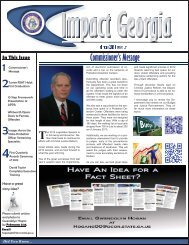Dealing with Death & Grief in the Workplace
Dealing with Death & Grief in the Workplace
Dealing with Death & Grief in the Workplace
Create successful ePaper yourself
Turn your PDF publications into a flip-book with our unique Google optimized e-Paper software.
<strong>Deal<strong>in</strong>g</strong> <strong>with</strong> <strong>Death</strong> & <strong>Grief</strong> <strong>in</strong> <strong>the</strong> <strong>Workplace</strong><br />
(exerpts taken from article posted on University of Houston-Downtown website at www.uhd.edu)<br />
These days, most people spend more of <strong>the</strong>ir wak<strong>in</strong>g hours at <strong>the</strong> workplace than at home.<br />
People who work toge<strong>the</strong>r may become close like an extended family. Therefore when a<br />
colleague dies or one is griev<strong>in</strong>g a death or a loss, <strong>the</strong> impact on his/her co-workers can be<br />
tremendous and can <strong>in</strong>fluence <strong>the</strong> workplace <strong>in</strong> a variety of ways.<br />
Productivity can be compromised and <strong>the</strong> dynamics of <strong>the</strong> workplace can change. When <strong>the</strong><br />
death is unexpected, <strong>in</strong> a violent act or an accident, <strong>the</strong> grief response can be quite traumatic for<br />
<strong>the</strong> survivors, fur<strong>the</strong>r impact<strong>in</strong>g work.<br />
<strong>Grief</strong> and loss occurs both at work and home, but <strong>the</strong>se two realms can be difficult to separate.<br />
Serious illness and death <strong>in</strong> <strong>the</strong> family commonly affect a person's workplace performance.<br />
Typically, <strong>the</strong> grief response results from a personal crisis-divorce, fire, work-related or auto<br />
accident; sudden death-heart attack, stroke, suicide, accident, homicide; chronic or term<strong>in</strong>al<br />
health problems, or job term<strong>in</strong>ation-layoff, or dismissal.<br />
Each person's experience of loss and each grief response is unique. However <strong>the</strong>re are some<br />
common feel<strong>in</strong>gs and symptoms often experienced by <strong>the</strong> griev<strong>in</strong>g. These <strong>in</strong>clude: sadness,<br />
betrayal, anxiety, fear, mistrust, irritability, guilt, anger, tension, depression, and loss of<br />
confidence. Griev<strong>in</strong>g people often develop physical symptoms such as abdom<strong>in</strong>al pa<strong>in</strong>,<br />
headaches, <strong>in</strong>somnia, fatigue, changes <strong>in</strong> appetite, <strong>in</strong>creased drug or alcohol use, restlessness,<br />
absentm<strong>in</strong>dedness, and poor concentration. These emotions and symptoms of grief response can<br />
significantly impact a person's ability to function.<br />
Thus, grief can upset workers and hamper <strong>the</strong> work environment. Unfortunately, most bus<strong>in</strong>esses<br />
cannot afford to halt production, sales or services to accommodate <strong>the</strong> grief response. Instead<br />
<strong>the</strong>y cont<strong>in</strong>ue on <strong>in</strong> <strong>the</strong> mode of "bus<strong>in</strong>ess as usual."<br />
When an employee experiences a loss or an illness <strong>the</strong>ir ability to deal <strong>with</strong> <strong>the</strong> griev<strong>in</strong>g process<br />
can become even more prolonged if <strong>the</strong> person does not feel aided by his/her manager,<br />
supervisor or employer. Those who feel cared for and supported are more likely to have<br />
improved recovery.<br />
Guidel<strong>in</strong>es for <strong>Deal<strong>in</strong>g</strong> <strong>with</strong> Co-workers & <strong>Grief</strong> –<br />
Acknowledge <strong>the</strong> coworker's grief. Let <strong>the</strong>m know you recognize <strong>the</strong> magnitude of <strong>the</strong>ir loss.<br />
However, ra<strong>the</strong>r than worry<strong>in</strong>g about f<strong>in</strong>d<strong>in</strong>g <strong>the</strong> best words to use, it is much more important to<br />
connect <strong>with</strong> <strong>the</strong> griev<strong>in</strong>g person. A s<strong>in</strong>cere expression of sympathy, "I'm sorry for your loss,"<br />
will let <strong>the</strong>m know you care.<br />
Many people are uncomfortable <strong>with</strong> display<strong>in</strong>g <strong>the</strong>ir emotions publicly and fur<strong>the</strong>rmore, may<br />
feel uncomfortable respond<strong>in</strong>g to o<strong>the</strong>r's public emotions, especially feel<strong>in</strong>gs of grief.
Those who f<strong>in</strong>d tears or expressions of strong emotions unsettl<strong>in</strong>g <strong>in</strong>st<strong>in</strong>ctively avoid a griev<strong>in</strong>g<br />
coworker; this avoidance makes <strong>the</strong> coworker feel even more isolated <strong>in</strong> <strong>the</strong>ir loss. One way of<br />
handl<strong>in</strong>g <strong>the</strong> coworker whom recently experienced a loss is to write a note or send flowers<br />
express<strong>in</strong>g sympathy ra<strong>the</strong>r than shar<strong>in</strong>g <strong>the</strong> sympathy face-to-face <strong>in</strong> a conversation at <strong>the</strong><br />
office.<br />
It is also important to listen to <strong>the</strong> griev<strong>in</strong>g coworker. Listen<strong>in</strong>g requires a little more emotional<br />
energy, but it can be very valuable to <strong>the</strong> bereaved. Each time <strong>the</strong> person has a chance to tell <strong>the</strong><br />
story, <strong>the</strong> loss becomes more real. In addition he/she ga<strong>in</strong>s a bit more perspective, which<br />
ultimately helps to lessen <strong>the</strong> stress of <strong>the</strong> loss.<br />
When Co-workers Experience a Personal Loss –<br />
• Acknowledge <strong>the</strong> co-worker's grief.<br />
• Let <strong>the</strong> co-worker know you empathize <strong>with</strong> <strong>the</strong> impact of <strong>the</strong>ir loss.<br />
• Expect tears and sadness.<br />
• Express sympathy openly and from <strong>the</strong> heart—whe<strong>the</strong>r <strong>in</strong> person or <strong>in</strong> writ<strong>in</strong>g.<br />
• Expect to listen to <strong>the</strong> story of <strong>the</strong> griev<strong>in</strong>g colleague aga<strong>in</strong> and aga<strong>in</strong>.<br />
• Respect <strong>the</strong> griev<strong>in</strong>g person's desire for privacy. Honor closed doors and silence <strong>in</strong><br />
conversation.<br />
• Offer specific and appropriate assistance—cook<strong>in</strong>g a meal, car<strong>in</strong>g for children or pets,<br />
help<strong>in</strong>g <strong>with</strong> shopp<strong>in</strong>g or o<strong>the</strong>r errands.<br />
• Remember to <strong>in</strong>clude <strong>the</strong> co-worker <strong>in</strong> social plans. Let <strong>the</strong>m decide whe<strong>the</strong>r to accept or<br />
decl<strong>in</strong>e <strong>the</strong> <strong>in</strong>vitation.<br />
• Accept less than <strong>the</strong>ir best performance from <strong>the</strong> co-worker for a while, but expect a<br />
return to <strong>the</strong> best over time.<br />
Help<strong>in</strong>g <strong>the</strong> Bereaved Worker –<br />
• Immediately acknowledge <strong>the</strong> death <strong>with</strong> a note or flowers sent from management and<br />
workers can demonstrate support for <strong>the</strong> griev<strong>in</strong>g person.<br />
• A workplace representative at <strong>the</strong> funeral can also convey <strong>the</strong> company's condolence.<br />
• Ask<strong>in</strong>g how <strong>the</strong> bereaved worker is do<strong>in</strong>g and <strong>the</strong>n listen<strong>in</strong>g to <strong>the</strong>ir response can be<br />
helpful.<br />
• Provid<strong>in</strong>g some flexibility <strong>in</strong> work hours even time off can help <strong>the</strong> worker cope <strong>with</strong> <strong>the</strong><br />
comb<strong>in</strong>ed stressors of work and grief.<br />
• Be<strong>in</strong>g patient and understand<strong>in</strong>g that <strong>the</strong> griev<strong>in</strong>g process takes time and that <strong>the</strong> worker<br />
will not quickly "snap out of it" will also help.<br />
Support<strong>in</strong>g <strong>the</strong> <strong>Workplace</strong> –<br />
• Let <strong>the</strong> person grieve <strong>in</strong> his or her own way. If <strong>the</strong> person f<strong>in</strong>ds work<strong>in</strong>g to be <strong>the</strong>rapeutic,<br />
do not lighten <strong>the</strong> workload. If <strong>the</strong> griev<strong>in</strong>g person is slow to move back <strong>in</strong>to work, try to<br />
ease his/her workload.
• Accept that <strong>the</strong> griev<strong>in</strong>g person's moods may be changeable for some time. It helps to be<br />
aware that <strong>in</strong>tense feel<strong>in</strong>gs can suddenly re-emerge which are beyond <strong>the</strong> person's<br />
control.<br />
• Expect tears. They are a normal part of <strong>the</strong> griev<strong>in</strong>g process.<br />
• Avoid be<strong>in</strong>g judgmental of however <strong>the</strong> co-worker grieves. Some people may become<br />
numb and <strong>the</strong> griev<strong>in</strong>g process is delayed for weeks or even months after <strong>the</strong> death.<br />
• Respect <strong>the</strong> co-worker's privacy, need for solitude and confidentiality.<br />
• Watch out for o<strong>the</strong>r employees. Old memories, feel<strong>in</strong>gs and grief may be triggered as a<br />
result of <strong>the</strong> co-worker's loss. It may be necessary to honor <strong>the</strong> old grief separately from<br />
<strong>the</strong> newly griev<strong>in</strong>g co-worker.<br />
• Be careful <strong>in</strong> shar<strong>in</strong>g stories of your own losses unless you're certa<strong>in</strong> <strong>the</strong> person can<br />
tolerate it.

















